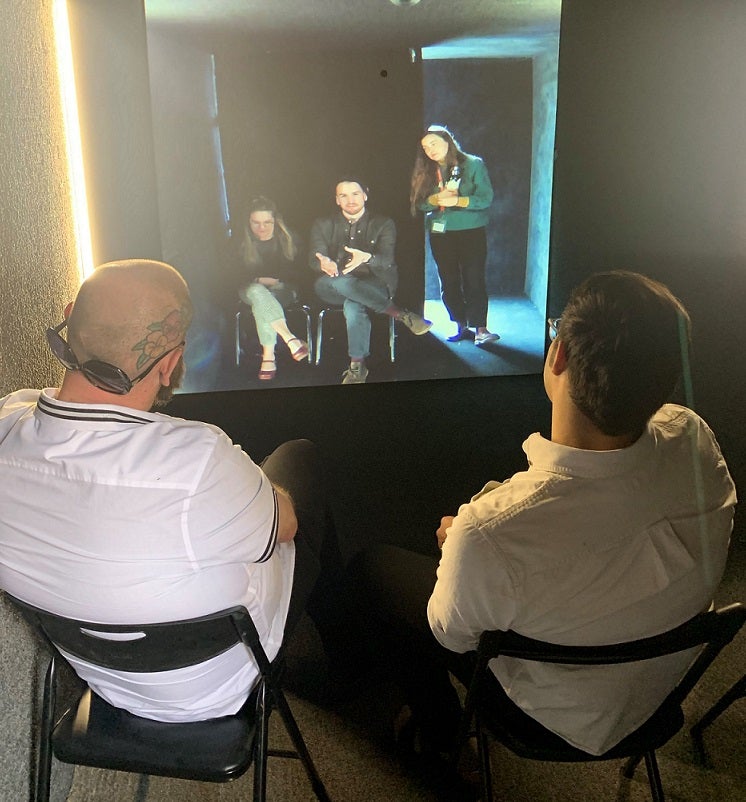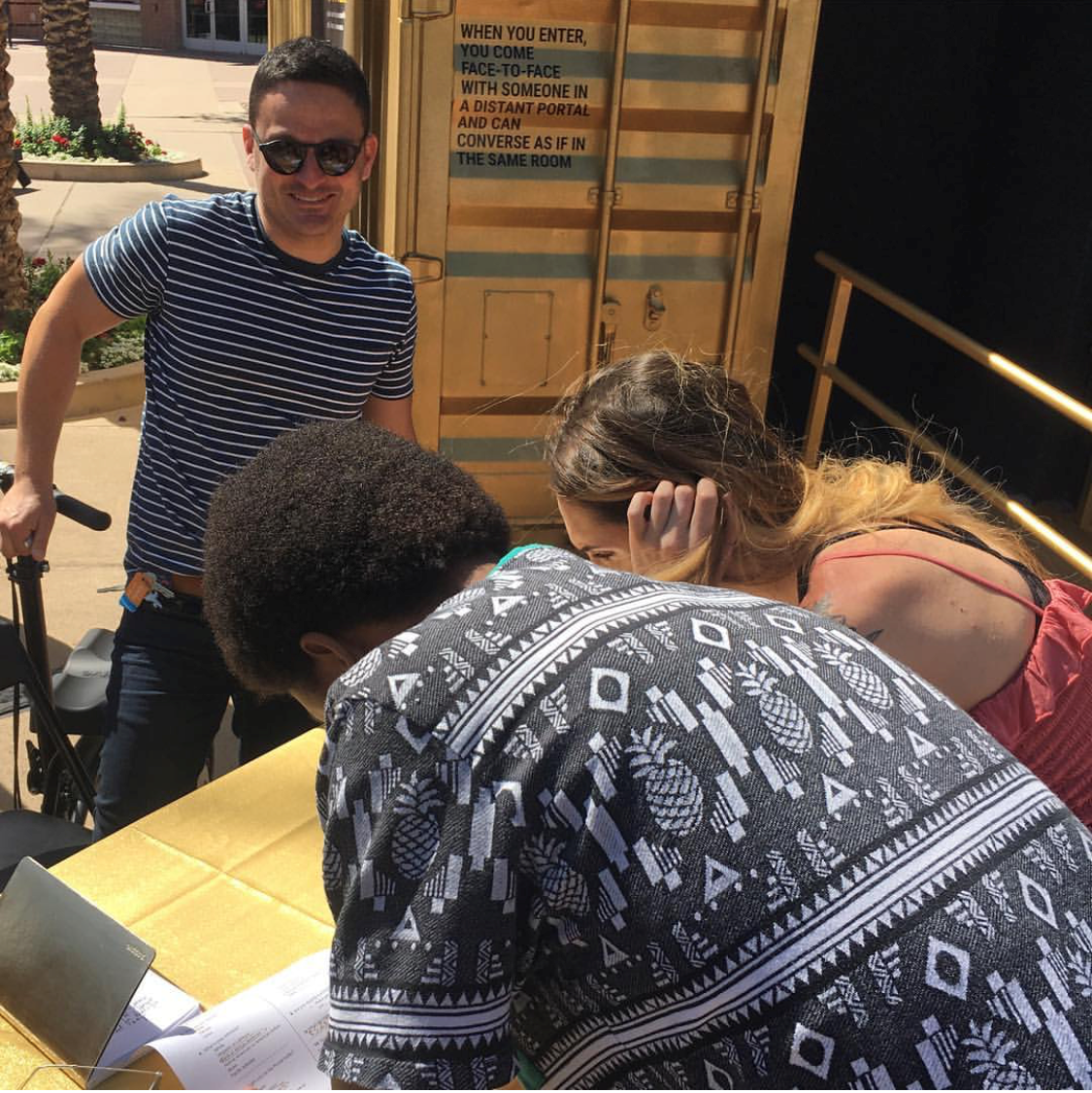Shipping container in Tempe offers golden opportunity to connect with the world

A gold shipping container serves as a portal for intercultural communication.
What's in that mysterious golden shipping container that appeared in downtown Tempe recently?
The big gold box, called a Portal, is part of a network of 40 containers across the world. Created by Shared_Studios, Portals are part of a global public art initiative created to give users an intimate social experience.
Entering a Portal container means coming “face-to-face” with someone in a distant Portal. Immersive audiovisual technology gives you the sense that you’re in the same room with someone — in reality, they’re inside an identical gold container somewhere else on Earth.
The Portal here is 8 feet by 8 feet by 20 feet and is wheelchair-accessible. Inside, gray carpet covers every surface except the “facing wall,” which is a floor-to-ceiling bidirectional video screen.
Step in one day and chat with Mexico City. Another day, go face to face with Stockholm. The next day, the Portal opens to Kabul, Afghanistan.
The Portal arrived in Tempe through a collaboration by the Downtown Tempe Authority, the city of Tempe and Arizona State University.
Brandon Ferderer, an instructor and doctoral candidate in the Hugh Downs School of Human Communication serves as curator of the Portal, organizing events and facilitating connections between the local community and the world.
Ferderer encountered the Portals Project while visiting New York City in 2015. Captivated by its communicative potential, he reached out to Shared_Studios, generating a partnership to study the impact of the technology on public discourse and its potential as a tool for intercultural and cross-cultural communication.

Two people inside the Tempe Portal converse with people in the Mexico City Portal.
“There are countless ways the Portal can facilitate connections between communities that otherwise wouldn’t ever interact,” said Ferderer. “For instance, a K–12 school teaching lessons on the Cold War might want students to speak to people in Afghanistan. They can provide information on what it was like when the Soviet-supported communist government took over their country. Students would gain context about this subject not found in their school books.”
Ferderer says the Portals were initially started as a public art project.
“In the Portal, there have been hip-hop dances, yoga classes, musical jams and political discussions,” he said. “Portals facilitate a connection between communities that otherwise wouldn’t ever interact.”
Julie Kent with the Downtown Tempe Authority helped bring the Portal to its current location on Mill Avenue’s Centerpoint Plaza.
“It’s a perfect fit for Tempe because this is an inclusive and innovative community,” Kent said. “The great thing about the Portal is that you’re connecting with cultures that you wouldn’t otherwise meet. The hope is that you will have more tolerance and more understanding and find common ground.”
The Portals currently exist in public parks, refugee sites, universities and school tech hubs. “Anywhere where there’s a community that wants to engage in a more global network,” Kent said.
ASU marketing major Miler Latinovich stepped inside the Portal recently. She came out into the sunshine a few minutes later. “Wonderful experience! Makes me fall in love with the world and cultures even more,” she said.
Video by Yuxing Lei/ASU Now
On a recent day at the Portal, a man wearing a motorcycle jacket appeared on the screen.
Saied Habibi was standing in a Portal in Herat, Afghanistan, just like the one in Tempe.
“It’s Saturday morning and traffic is terrible,” he said.
“How do people in Afghanistan view the U.S.?” a participant in the Tempe Portal asked.
Habibi paused and grinned.
“Are you asking about the American people or the American government”? he queried.
“Both,” said the Tempe Portal visitor.
“Well, Afghans are aware that the American people aren’t necessarily the same as their government,” Habibi suggested.

Hugh Downs School doctoral student Brandon Ferderer, who serves as curator, registers community members for the Portal experience.
He went on to discuss the complicated relationship Afghans have with America, being both grateful for American military assistance and ready for their country to be free of U.S. presence.
The man in the Tempe Portal asked if there was one thing Americans should know about Afghanistan.
“Know that the picture of Afghanistan you get in the media is not the entire story of Afghanistan,” Habibi replied. “We are so much more than that.”
“So are we,” the Tempe Portal participant added. “I guess it takes a conversation to really understand that.”
The Tempe Portal is free and open to the public 10 to 15 hours per week. It is staffed when open and locked up at night.
A schedule is posted on the Tempe Portal website with weekly hours and upcoming chats with cities and countries.
More Local, national and global affairs

Inspired by university tradition, a new lantern walk debuts with focus on mental health in the military
Arizona State University’s Lantern Walk is one of the school’s oldest and most treasured traditions. Each year, students, alumni…
ASU-led study examines effects of political turmoil on young voters
Young adults approaching voting age in the U.S. are doing so in a political climate unlike any other.Over the past four years,…

Foreign policy experts see Arizona as pivotal on world stage
America’s relationship with other countries is in flux right now, and Arizona, with its booming economy, is a perfect example of…